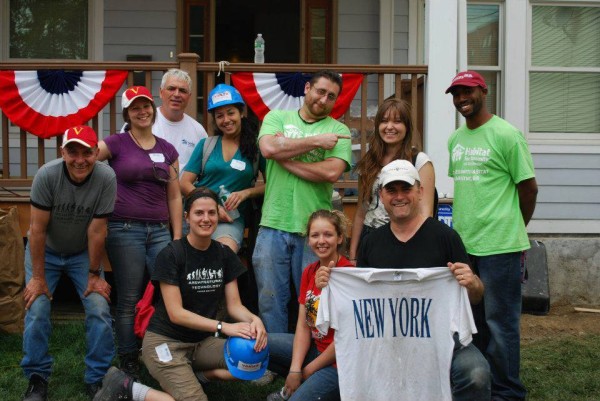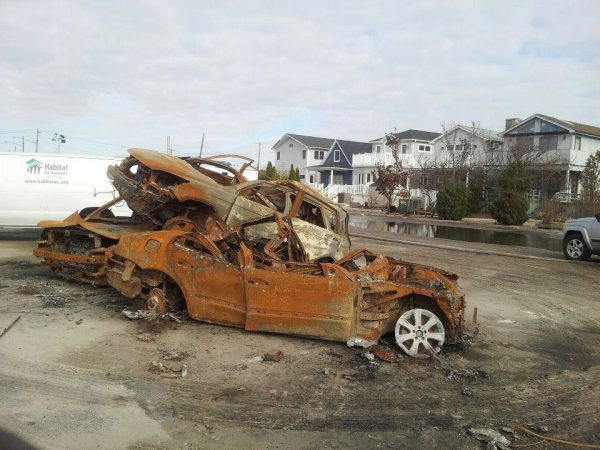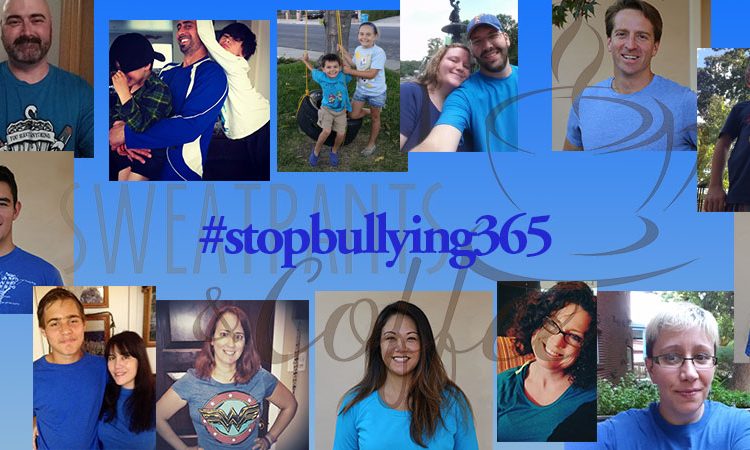It’s a rare thing to be able to work at a job and know that you are making a tangible difference in the community around you. Mike Garvey is one of the people who gets to do that. It’s not glamorous work – in fact it’s often sweaty, dirty, and sometimes depressing, but in the end, it is deeply rewarding. He works for Habitat For Humanity in Westchester County, New York, and he spoke with us about what it’s like, why it matters, and how people like you can get involved.
What is Habitat for Humanity’s mission/philosophy?
Habitat’s official mission statement is this: “Seeking to put God’s love into action, Habitat for Humanity brings people together to build homes, communities and hope”. The main purpose behind Habitat is to see to it that everyone has a decent home to live in. However, we are heavily involved in disaster recovery around the world as well as helping current homeowners repair critical home damage. I run a program called “A Brush With Kindness” for Habitat where we find existing homeowners who are having problems keeping their home well-repaired and we help them fix the horror that has befallen them. Most of the people I help are veterans, the elderly and disabled, and people on fixed incomes who just can’t afford to keep up with the insanely high cost of living in a home they own. Not many people know this, but Westchester County has the highest median property tax IN THE COUNTRY.
How exactly does Habitat work? How are projects chosen and what does the organization do to see them through?
Families are chosen based on a bunch of things like income level (families have to show proof that they are in the low-income bracket), willingness to volunteer, and even things like credit history. Families must put in a minimum of 500 hours of “Sweat Equity”, which is what we call the monetary cost of volunteering. When people work with us, we consider it money. We get our donations from private citizens, corporations and companies like law firms, as well as grants and good old-fashioned penny collecting in water fountains. That last part isn’t true, but we could probably get some decent copper out of those things. Pennies are still copper, right? (Editor’s Note: False. Pennies are mostly zinc these days. Better stick to grants.)
Habitat for Humanity is well known and respected in the New York area, perhaps more so than in other regions. Why do you think the organization is so prominent in your area, and what can other communities do to increase visibility?
Habitat is known internationally, actually, as we are involved in disaster relief around the world. We were a very visible presence and still are in places like Haiti and New Orleans. We may be well-known in New York now because we are in the Far Rockaways helping to rebuild after Hurricane Sandy hit the East Coast. We have had thousands of volunteers in the Rockaways helping to clean up the debris, scattered household items, and glittery vampires that have plagued it. (Editor’s Note: No confirmation on the glittery vampire thing.)
You’re very passionate about the work you do. What is your personal connection to Habitat and why do you feel so strongly about the particular county you’re based out of?
I came into Habitat for Humanity of Westchester through AmeriCorps, which is a government program dedicated to placing American citizens in community service positions and dedicated to improving the quality of life in communities. Among the many available positions all over the country when I was accepted to AmeriCorps, the most attractive one was with Habitat for Humanity of Westchester. Lower Westchester and the Bronx is where I was born, raised, and slapped around by various ethnic groups. It is where my mother and father were born and where my formative years took place. I have watched the area deteriorate into a strange dichotomy of affluence and crime-ridden poverty. Within my own city of Mount Vernon there is a dividing line between the North and South sides, where the South side (where I live) is considered a high-crime, high-poverty area. This is typical of the cities in lower Westchester, and I saw working for Habitat for Humanity as an opportunity to improve the conditions of the area that I love.
How does Habitat empower their clients? (I have heard that the future residents participate in the building process, for example. Is that true? Have you met them? What have their reactions been? How were their situations improved? Do they then give back as volunteers to other home projects?)
We interact regularly with all of our chosen families. In order to qualify for the house, besides the financial requirements, families have to put in a minimum of 500 hours of Sweat Equity with us, and that does not necessarily mean actually working on the house. Some people who qualify cannot physically do things like hauling blocks for a retaining wall, digging a pipe trench, or performing an interpretive dance for Judy Blume’s complete literary catalog. So they help us out by putting in fundraising time, working the counter at one of our used-goods ReStore locations, or doing impressions of Sesame Street characters for me on demand while I’m on a work site.
No, but seriously, the quality of life not only improves for every family we’ve placed, but they also gain something they didn’t have before: extra, super annoying family members who also happen to know how to build and fix houses. Truthfully, we continue to have a relationship with the families long after they are placed. My program does a lot of neighborhood revitalization and cleanup, and the families we’ve placed in the areas we work in, if they aren’t physically out there helping us, are lending us their hoses to water plants.
This is the first nonprofit organization you’ve worked for. How and why is the work you’re doing more fulfilling than your corporate past? Why were you drawn to Habitat specifically?
The bottom line is that no matter how much a company, ANY dedicated corporation, who deals in retail or financial business claims to “give back to the community”, or who donates to organizations (such as Habitat, for example) are actually committed to improving the quality of life in areas. Their main purpose is to generate income. I am not condemning that philosophy inherently, but I am saying that the main focus of their income generation is profit. We need organizations that exist to help humanity rather than profit off it. Having worked for a number of companies large and small, the mentality of trying to squeeze that last cent out of people who really shouldn’t be spending it is bloody rampant, and I never felt good about being a part of that. It’s not in my nature to try to talk someone into buying something I know they can live without. People can say things like, “Well, if they’re dumb enough to let some salesman talk them into buying that shit, then why shouldn’t I be the one to get that money out of ‘em?”, or “That will teach them to be more responsible with their money.”, and other such predatory comments. If money is to be made, I don’t believe it should be by exploiting others’ weakness. Up until working for Habitat, I never, EVER felt good about the work I was contributing to on any other level than pleasing my superiors. I have spoken at great length in the past about how people can still be capitalists and make money without having utter disregard for their neighbor or their community. This job allowed me to put my money where my mouth is. Now, at the end of the day, when I’ve just finished nailing plywood onto a hole in a roof so the tarp we are putting up doesn’t sink into it and pool water, all I have to do is look at the smiling faces of the family I have just helped, and I don’t have to feel like I haven’t contributed anything to the world that day. The point is, I never gave up my hope, when I was out of college and looking for a job in the real world, that I could make a difference and find a job that doesn’t completely make me disgusted with myself at the same time. It took me a while, but I achieved it. Follow your dreams, even if your dreams happen to be John Stamos spoon-feeding you Greek yogurt in a fig-leaf bikini. Good GOD, that man is beautiful. (Editor’s Note: We strongly concur.)
The New York area has been hit hard this year in terms of extreme weather, particularly in the wake of Hurricane Sandy. I understand Habitat has been heavily involved in the cleanup and rebuilding process – can you tell us a little bit about that?
Habitat of Westchester is based in Westchester County, which is the bordering suburb of New York City. We aren’t the next-door neighbors of Queens, but when all those people were displaced and up to their ears in standing water, Habitat leapt. Hurricane Sandy hit Queens hard. While the areas it hit were evacuated properly and people were safe, the houses they had down there were utterly destroyed. Entire houses were pulled off their supports and flipped sideways against other houses. People were running around trying to find their possessions. Families were standing in front of the ruins of their homes and sobbing against each other. Immediately after that happened, Habitat of Westchester could not stand by while our neighbors in Queens were suffering. We mobilized and set about helping.
Tell us about a project you’ve worked on that was especially memorable.
Actually, in the last month or so, the A Brush With Kindness program received its most meaningful project thus far. We received a call from a gentleman who lived in Connecticut and his family was here in Westchester and was in dire need of help. This gentleman said that he couldn’t even describe the situation, and that it needed to be seen to be believed. As I checked the house, it became clear to me that the four people living there had given up on life. Their elderly mother had passed away in the last few years and they each had a slew of health problems that was contributing to their depression. Their mother, apparently, was the glue that held them together as a unit, and once she passed, they felt they had little or no hope. Their roof was literally falling into the house and had at least four or five giant holes in it, so every time it rained, the rain would fall directly into the house. Pouring rain, right onto the inner walls and floors. Their hot water heater gave out four months prior and they had been without hot water to bathe in or wash their dishes with for just as long. To make matters worse, they appeared to be hoarders. There were entire rooms of the house that were filled with garbage and clutter that could not be entered. They had 10 or more cats, and a dog. To top it ALL off, because their basement was also filled with stuff, when the heater broke down, it flooded the basement. There was about a foot of soaked sludge on the ground in the basement, containing godknowswhat, and it had gotten so bad that they had put down wooden planks over it so they could get past it to the laundry machines. It was a daunting project, to say the least.
BUT, when I went in there and started bagging things up with volunteers, their entire outlook changed. We weeded and trimmed the front yard. We got a dumpster and got rid of more than half of the clutter in that house. I personally got up on that rickety-ass roof and slapped some plywood, roofing tar, and a tarp across some of the worst areas. Now, they act as if I’m part of the family. They call me to check in on me, make sure I’m getting enough rest and not stressing myself out too much. Why? Because I showed them I was committed to them. I stayed on their roof for 10 hours, working and learning, in the 95-degree heat, because I wanted them to stop having rain hit them in the face in their own home. I wanted them to stop walking around areas in their house that were sinking into the bloody basement. Everything I’ve asked them to do since we started there, they have done. They are different people than the gray, sad family I met when I walked in there the first time. They believe in me, and I believe in them. Everyone should know the feeling of having a second chance, and I thank God that I was there to be able to give it to them.
You work very closely with volunteers. How can someone get involved with volunteering for Habitat? Why is your organization a good outlet for volunteer groups?
Habitat is dedicated to not only housing people affordably, but also teaching people how to build so that every generation will have working knowledge of how to perform basic building tasks like sheet-rocking, plastering, painting, woodcutting, etc. We are also dedicated to cleaning up neighborhoods and engaging people in the community to help us with this endeavor. Volunteering with Habitat in general is a great outlet to work off some steam and do something healthy and positive while you do it. Learn how to build and maybe you can help a relative or even yourself on a home improvement project. Bring your children and help create a new generation of knowledgeable builders to build for themselves or to help others who need it. We have tons of companies like MasterCard, MorganStanley, Cisco, JP MorganChase, and even IBM who come out in force to help us transform these areas in Westchester into something everyone can enjoy.
The best way to volunteer for Habitat is actually by contacting me at 914-450-1664 or by emailing me at mike@habitatwc.org. We do corporate volunteer groups, big holiday builds, and even small neighborhood cleanups, which is what we need help with the most. You can go to www.habitat.org if you want to volunteer nationally (or even internationally), and let them know that Mike from Westchester Habitat in NY sent you there. Come out and help families and learn how to build houses in the process. It will do you a world of good.








Alita Abkemeier
There is certainly a great deal tto learn about this issue.
I really like all the points you’ve made.